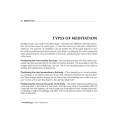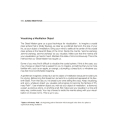self-liberation : ค้นหาหนังสือธรรมะ หน้า 2 / 23
หน้าหนังสือทั้งหมด

38
Chapter 4: Cultivating Good Emotions through Meditation
The extracted text from the image is:
-----------
Chapter 4
Those who meditate with consistency will have good emotions, and can easily see and understand the truth that everyone has good and bad in
Chapter 4 emphasizes the significance of regular meditation in helping individuals recognize the duality of good and bad within themselves and others. By understanding this balance, people can cultiva

39
Cultivating Good Habits in Education
Teacher should remind themselves often that only good habits cultivate progress in academic and moral knowledge.
Right Thought — About Human Survival, Livelihood and Interaction
Right thought comes fr
ในบทความนี้กล่าวถึงความสำคัญของการปลูกฝังนิสัยดีในด้านการศึกษาและจริยธรรมสำหรับครูและนักเรียน ครูควรเตือนตัวเองเสมอว่านิสัยดีจะช่วยพัฒนาความรู้ทั้งด้านวิชาการและจริยธรรม การพูดและการกระทำที่ถูกต้องเริ

51
The Transformative Power of the Noble Eightfold Path in Buddhism
refer to something which 'transforms' the person into noble states, so that itself is comparable to the creator. At the same time, it must refer also to the shared or same kind of qualities or essence
This text delves into the concept of transformation in Buddhist philosophy, specifically through the Noble Eightfold Path. It highlights how this path aids in the eradication of defilements, enabling

52
Understanding the Noble Eightfold Path and Threefold Path in Buddhism
[Right concentration, again, becomes the basis of right views, right aspirations, and other steps of the noble eightfold path, which is now experienced on a higher level, and this spiral-like progress
This text elaborates on the interrelationship between Right Concentration, Right Views, and Right Aspirations as pivotal elements of the Noble Eightfold Path leading to liberation. It discusses the sp

82
Types of Meditation
78 MEDITATION
TYPES OF MEDITATION
Buddhist texts, such as the Visuddhimagga¹, describe forty different methods of practice. All of them have the same goal: to train the mind to be still and to attain
Buddhist texts, like the Visuddhimagga, outline 40 meditation methods with the same goal of mastering the mind to achieve Buddhahood. Meditation can be categorized into three types: positioning the mi

118
Guided Meditation Through Visualization
114 GUIDED MEDITATION
Visualizing a Meditation Object
The Great Master gave us a good technique for visualization: to imagine a crystal clear sphere that is totally flawless, as clear as a polished d
This guided meditation technique involves visualizing a flawless crystal sphere or any familiar object, such as fruit or jewels, to achieve mental clarity and peace. The method, taught by the Great Ma

51
การวิเคราะห์และความเข้าใจในพุทธศาสนา
วิวัตนหา—ไม่อยากเป็น
วิมาสา
(vimamsa) analysis; understanding;
thoughtfulness; intelligence and common
sense; observation; reasoning; investigation;
analysis and evaluation.
วิมาณ
heavenly abode; heav
บทความนี้สำรวจคำสำคัญในพุทธศาสนา เช่น วิวัช, วิสุทธิธรรม และบทบาทของงานเฉลิมพระเกียรติในวันวิสาขบูชา ซึ่งเป็นวันที่สำคัญที่สุดในพุทธศาสนาที่เฉลิมฉลองการเกิด ตรัสรู้ และดับขันธ์ของพระพุทธเจ้าในวันเพ็ญเ

72
Understanding Nirvana and the Path to Enlightenment
Nirvana
Nirvana (Pali, Nibbanna) is the state of ultimate happiness -- the happy condition of enlightenment -- the highest spiritual attainment. This is not the sense-based happiness of everyday life;
Nirvana, or Nibbanna, represents the ultimate state of happiness in Buddhism, transcending the sense-based joys of daily life. Attaining Nirvana marks the end of the rebirth cycle, granting liberation

89
The Stories of Enlightened Monks
The story of Dharmma (๙)
A few reach the other shore & Those who follow the Dhamma are liberated.
Libertation thoughts & Mind are beyond worldlyness.
1. The story of Monk Jaya (๙)
The story of Monk M
This text narrates the enlightening stories of several monks, including Monk Jaya, Mahakassapa, Bhaisaputra, Anurudh, Sanyasi, Kosambi, Sumpamathera, and Ravantheera. It highlights their journeys towa

30
Vinayapitaka Editions and References
Vinayapitaka vol.IV. 2001. edited by Hermann Oldenberg. Oxford:
PTS. (first printed. 1882)
Vinayapitaka vol.V. 2006. edited by Hermann Oldenberg. Oxford:
PTS. (first printed. 1883)
อ้างอิงอื่น ๆ
PT
Vinayapitaka editions include volumes IV and V, edited by Hermann Oldenberg, published by the Pali Text Society with first prints in 1882 and 1883 respectively. Other important references include Nori

121
The Four Virtues of Self-Improvement
2. Self-improvement (Dama)
“The second virtue is to always improve oneself. I kept improving myself professionally. From an ignorant person, I kept advancing myself until I was able to be a good provi
This text discusses the four virtues that foster personal development. The first virtue emphasizes continuous self-improvement to advance one's career and resist vices. The second virtue focuses on en

44
Qualities of a Stream-Attainer in Buddhism
mentioned in the canon.40
The title ‘son of the Blessed one’ suggests that, through the
Buddha, the person was (re)born to the same plane (bhūmi) to which
the Buddha belongs, i.e., passing beyond the
This text delves into the characteristics of a Stream-attainer, identified as a noble disciple who is reborn to a transcendental plane through the Buddha's teachings. Key qualities include association

61
Understanding Dhammakaya Knowledge
The Dhammakaya Knowledge is taught by the Buddha to constitute the transcendental, blissful, eternal, and pure Self of the Buddha. Dhammakaya doctrines can be found in the scriptures of all major Budd
Dhammakaya Knowledge is a profound teaching from the Buddha that emphasizes the transcendental, blissful, and pure nature of self. This concept is integral to all major Buddhist schools, including The

12
Understanding Self-Worth and the Consequences of Actions
self-worth. Human life can only occur with a man and
a woman, but should only be when it is appropriate.
Promiscuity, illicit affairs and sexual violations can
lead to deceit and abortions, which in t
This content discusses the critical relationship between self-worth and the choices people make concerning intimacy and sexuality. It points out that human life is sacred and should only be pursued wi

23
Understanding Marriage Expectations
hope that you will find someone else to help you with the
many things in life.
There are some who get married because they expect
that their spouse will treat them favorably in different ways;
and at
This text discusses the misconceptions surrounding marriage and the impact of unrealistic expectations on relationships. Many enter marriage hoping their spouses will meet their needs continuously, wh

34
Understanding the Three Characteristics of Existence
When we receive fortune, prestige, recognition or happiness,
our minds will remain calm, not overwhelmed or attached.
A person who is aware of suffering and happiness has
trained the mind to be as sta
This text elaborates on the Three Characteristics: impermanence, suffering, and non-self, as fundamental truths of existence in Buddhism. It highlights how fortune, prestige, and happiness are tempora

21
Building Strong Relationships: The Importance of Self-Reliance Before Marriage
Part One: Family Life
When life partners learn how to resolve their mental
baggage and restrain their negative emotions, they will be
able to maintain a sense of positive regard for one another.
Partn
การพัฒนาความสัมพันธ์ที่แข็งแกร่งระหว่างคู่รักต้องการการจัดการกับอารมณ์เชิงลบและความเชื่อมั่นในตนเอง การพึ่งตนเองเป็นกุญแจสำคัญในการรักษาความสัมพันธ์ที่แน่นแฟ้น ก่อนแต่งงาน ควรพิจารณาคุณลักษณะที่จำเป็น

29
Part One: Family Life and the Importance of Truthfulness
Part One: Family Life
or not each will be responsible enough to assist with another
family member's life, death, success or failure.
A person who is truthful exhibits responsibility in many
ways:
In s
In this section, we discuss the significance of being truthful in our relationships and responsibilities. Truthfulness is essential in speech, work, and friendships. It emphasizes kindness and sinceri

30
Family Life: Self-Control and Endurance
Part One: Family Life
day. Self-control can also be referred to as "loving to train our
self". In order to do this, we need a great mentor, or teacher.
The problem, of course, is how to find one. Not
Part One of this text discusses the significance of self-control and endurance in personal growth. It highlights the necessity of finding a wise mentor to guide us in our journey to self-improvement.

118
Truth for the Family: Dhamma Teachings
Part Five: Truth for the Family
about Dhamma and learned that there was a set of teachings
specifically tailored for householders. They include four
main virtues, which are:
1. Truthfulness (sacca): T
Part Five discusses essential virtues for householders taught in Dhamma, emphasizing truthfulness, self-improvement, and enduring hardships. Truthfulness (sacca) encourages honesty and accountability,
